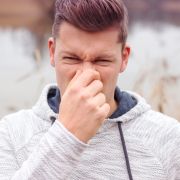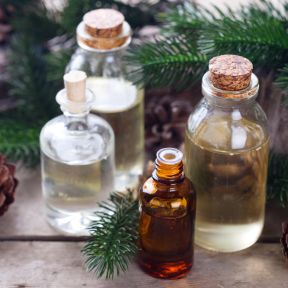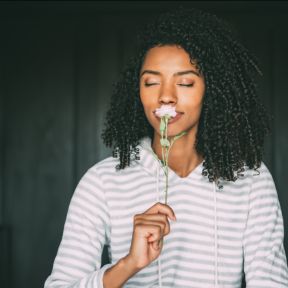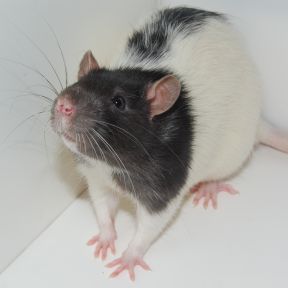Smell is our oldest sense. One of our earliest functions as simple organisms was to detect helpful or harmful molecules in our environment and then seek them out or avoid them. The brain's olfactory bulb still sits alongside regions processing emotion. As a result—although scientists aren't sure of the exact mechanism—dysfunctions of smell are closely associated with mood disorders.
Contents

Olfaction, the human sense of smell, can bring someone pleasure (the sweet fragrance of flowers) or generate disgust (e.g., the stink of rotting meat). It can boost mood, stir up old memories, and even drive a person to romantic distraction. People also use their sense of smell to detect hazards, such as smoke or gas, and without that ability, they can become anxious about their safety. In aromatherapy, different kinds of scents are breathed in or applied to the skin to reduce stress, promote sleep and relaxation, and ease pain.
While sight and hearing are often regarded as the top of the senses hierarchy, smell is an old and powerful sense. People often don’t realize the crucial role that smell plays in their understanding of their environment and many everyday decisions. Social odors help humans build relationships, find mates, retain key memories, avoid dangers, and prevent disease.
Humans have both a main and accessory olfactory system to detect smells and chemicals. An odor enters the nose through the nostrils or through the back of the throat while someone is swallowing or chewing. The odor molecules dissolve when they come into contact with the mucus lining in the nasal cavity. Olfactory neurons identify the odor and transmit information about it to the brain.
The notion that humans have a poor sense of smell is a widespread myth. For a long time, scientists believed that the brain could only differentiate approximately 10,000 odors. However, new research suggests that people can discriminate as many as a trillion odors (much closer to the half a million tones and millions of colors that humans are said to be able to detect).
Scientists have identified 10 categories of scents: woody/resinous, fragrant/floral, fruity (non-citrus), minty/peppermint, sweet, popcorn, lemon (citrus), chemical, pungent, and decayed. Most odors can be classified using one or a combination of these types of smells.
According to evolutionary psychology, people are highly attuned to disgusting stimuli that could pose a threat to their survival. For example, their sense of smell could help them avoid rotting food that could make them ill. People are also unconsciously sensitive to certain pheromones, making them wary of risky, short-term mating opportunities.
Humans developed a disgust reaction as protection against threats to their survival, such as toxic chemicals and contaminated food. Their olfactory ability enabled them to adapt to their environment, making them more likely to pass on their genes to future generations. Those who have encountered life-threatening, disgusting stimuli may become hypervigilant to them in the future.
A scent is generally sweet-smelling and fragrant, whereas a smell can be either pleasant or foul. The term “smell” can refer to either an odor or to the act of smelling itself.
A person’s sense of smell tends to fluctuate during the day according to circadian rhythms. While they may be sensitive to odors when awake or in the early stages of sleep, they cannot depend on their sense of smell to alert them to dangers (e.g., fire, toxic fumes) while in the later stages of sleep. Smoke and carbon monoxide detectors are necessary, since an alarm sound can penetrate sleep.
Artificial scents like cologne and perfume can wind up masking a person’s natural odor and undermining their sex appeal. This can create problems in relationships because people unconsciously assess compatibility through smell, which can be confused by artificial odors. Experts recommend going fragrance-free for a short while early on in the relationship to see if a partner’s true scent is attractive or not.
The sense of smell and taste are closely related. What people think of as the “flavor” of food is often a combination of how it looks, tastes, and smells. Through a process called retronasal olfaction, the act of chewing or swallowing food causes odor molecules to drift up the back of the nasal cavity, where they can be detected and analyzed.

Research has found that people who lose their sense of smell become more depressed, and people with depression have a worse sense of smell. Loss of smell, or anosmia, also reduces the pleasures of eating and socializing over food, reduces sex drive, and raises levels of concern about bodily hygiene. People with anosmia may shower several times a day, overload on fragrances, or avoid going out altogether.
The most common causes of smell loss have traditionally been disease, infection, and trauma, but olfaction faces a new threat from air pollution. Several studies have found that residents of smoggier cities have worse senses of smell than people living elsewhere. Compared with residents of Mexico City, for example, people in the cleaner city of Tlaxcala required weaker aromas to detect coffee and orange drink and could better distinguish between closely related smells.
Some types of smell loss respond to antihistamines or topical steroids. Researchers are also exploring gene therapies and stem-cell treatments to enhance the system's partial ability to repair itself.
A complete loss of smell is called anosmia, while a partial loss or diminished sense of smell is often referred to as hyposmia.
Head injuries and neurological disorders can contribute to a lost sense of smell. Physical changes like growths in the nose and allergies can also lead to loss of smell. Some medications can cause a decrease in smell sensitivity, though the effects are usually temporary. Illnesses that affect the upper respiratory tract, such as a cold or the flu, can also be detrimental to one’s sense of smell.
Smell loss caused by head injury, illness, or a medication usually returns once the issue has been resolved. In conditions where the olfactory nerve or brain has been damaged, the sense of smell may not be fully recoverable. There is no treatment for loss of smell due to aging, or presbyosmia; however, there are some ways to cope better with it.
Certain medications can interfere with one’s sense of smell, including but not limited to: specific antibiotics, ACE inhibitors, beta-blockers, estrogen, zinc, and amphetamines. Individuals should also be careful about the long-term use of nasal decongestants, as they can have a negative impact on smell.
Human taste buds can discern basic flavors: salty, sweet, bitter, sour, and umami (or savory). However, much of the nuance and pleasure of flavor actually comes from the process of retronasal smell, where odors waft into the nasal cavity as from the act of eating or drinking. Taste without smell is often bland and more difficult to differentiate.

Some people may experience olfactory hallucinations, known as phantosmia, when they detect a smell that no one else seems to notice. It’s not uncommon for individuals to smell smoke, gas, or some other foul odor that isn’t actually present in their environment. Olfactory hallucinations are often a sign of health problems, like migraines, head trauma, and epileptic seizures. They can also indicate mental health conditions, like depression and psychosis.
Everyone has a unique body odor, which is used to differentiate kin (those who smell similar) from strangers (those who smell different). However, many people do too much to mask their natural scent with obsessive cleaning and deodorizing and applying perfume or cologne. Under ordinary circumstances, people find their own signature body odor too familiar and too faint to detect.
What is that strange smell? People experiencing an olfactory hallucination, or phantosmia, will complain of smells that aren’t truly present in their surroundings. Olfactory hallucinations are frequently associated with a head injury, migraine, severe respiratory infection, inflamed sinuses, temporal lobe seizure, brain tumor, and Parkinson's disease.
Olfactory hallucinations produce phantom smells that no one else can sense. Often, these are unpleasant or foul odors, such as rotten eggs, gas fumes, bad perfume, garbage, or something burning. They can occur in one or both nostrils and are often an indication of other health issues.
Food tends to develop a pungent smell as it goes bad and begins to rot, frequently due to the growth of spoilage microbes (e.g., bacteria, mold, and yeast). However, someone can suddenly find that unspoiled food smells or tastes bad, even when there’s nothing wrong with it. This change in one’s sense of smell can be a warning sign of possible health concerns.
Although olfactory cells are able to regenerate, one’s sense of smell naturally fades as they grow older. Natural loss of smell typically begins around age 60. It is often gradual enough that the individual fails to notice and, thus, doesn’t find it that distressing.
Unlike ordinary sweat meant to cool the body after physical exertion, stress sweat smells stronger and more pungent. It’s made by different glands that activate when stress hormones flood the body due to a perceived threat. This activates the fight-or-flight response, which includes stress sweat. Some experts believe the stronger stench was an adaptation to warn the individual and their community of imminent danger.
People who are closer to death are likely to have a weaker sense of smell. They may not perceive common scents, like lemons or onions, as well or at all. In fact, they may not smell much of anything at all. Evidence suggests that the strength of a person’s ability to detect smells is a good predictor of impending death.
Yes, loss of smell and taste are both possible symptoms of COVID-19. In mild cases of the disease, they may even be the primary sign that someone is infected.

Smell may be the most important, albeit the most subtle, factor in physical attraction, because the nose can suss out complex mechanisms like sexual compatibility, although the conscious mind is unaware of it. The human body has more than 100 immune system genes known as the MHC, or major histocompatibility complex; these genes help our immune system to identify unwanted pathogens. The MHC determines, for example, whether an organ donor is compatible with a patient in need of a transplant.
MHC also determines histocompatibility, influencing human mating choices. In MHC experiments, women are generally more discriminate and fussy about smells and odors, possibly because they are more invested in the results of reproduction, bearing children, and caring for them.
In one famous study, researchers had male subjects wear new T-shirts for two consecutive nights. Female study participants later sniffed each shirt and deemed which ones had the most attractive scent. They preferred the shirts worn by men more immunologically dissimilar to themselves. This makes biological sense, as pairing dissimilar immune systems can mean healthier offspring. Some studies indicate that dissimilar MHC genes, which recognize foreign substances, resulted in lower rates of early miscarriages for couples.
While perfumes and colognes can initially attract someone’s attention, they pale in comparison to the major impact that human body odor has on sexual attraction. People are unconsciously attracted to pheromones that indicate sexual interest, as well as natural body odors indicating a strong and healthy immune system. Healthy foods, such as garlic, can also enhance one’s natural scent and attractiveness.
People are drawn to scents that evoke nostalgia and recall fond memories, frequently from childhood and young adulthood. These are unique to the individual and their personal history and experiences.
People are unlikely to be attracted to those with a similar MHC profile, preferring mates with a dissimilar MHC profile who can help pass along strong and healthy genes. Unusually sweet or strong body odors can be an indication of medical issues and act as a turn-off for potential mates.
Women smell more appealing to men during the fertile phase of their menstrual cycle when they are most likely to conceive. This effect is unconscious but powerful.
Pheromones, chemical signals that play a part in sexual attraction, are typically detected by the sense of smell. For example, evidence demonstrates that heterosexual men can detect “chemosignals” from a sexually aroused woman through olfaction.















